Global leaders in autoimmune research gathered for the 2025 Colton Consortium Symposium last month, sharing breakthroughs from foundational science to translational therapies and forging collaborations to improve patient lives worldwide.
15 minutes
The 2025 Colton Consortium Symposium (July 16-19, 2025) brought together scientists, clinicians, and industry partners from around the world for four days of scientific exchange on autoimmunity and strategic planning in the heart of Manhattan. Held at the historic Lotte New York Palace, the event convened members of the Colton Consortium for Autoimmunity—a global research partnership uniting top investigators from the University of Pennsylvania, New York University, Yale University, and Tel Aviv University and powered by the generosity of Judy and Stewart Colton.
Throughout the week, participants shared emerging insights into the mechanisms of autoimmune disease, spotlighted high-impact cross-institutional collaborations, and demonstrated the Consortium’s focus on bridging foundational science and impactful real-world treatments. The gathering reflected the depth and reach of the Consortium’s research portfolio, which now includes 41 active pilot projects and three Centers of Excellence. In the past year alone, the Consortium secured 25 new grants totaling $46 million in additional funding, filed 23 intellectual property applications, and launched 21 private sector partnerships. The symposium served as both a celebration of this momentum and a working session to shape the Consortium’s next chapter.
“This week marked a turning point for our community. We’re not just collaborating—we’re building a global ecosystem for autoimmune discovery. By connecting fundamental science to translational innovation, and academia to industry, the Consortium is creating something truly unique: A model for how we accelerate breakthroughs and bring real solutions to patients more quickly,” said E. John Wherry, PhD, Director of the Colton Center for Autoimmunity at the University of Pennsylvania and the broader Colton Consortium.
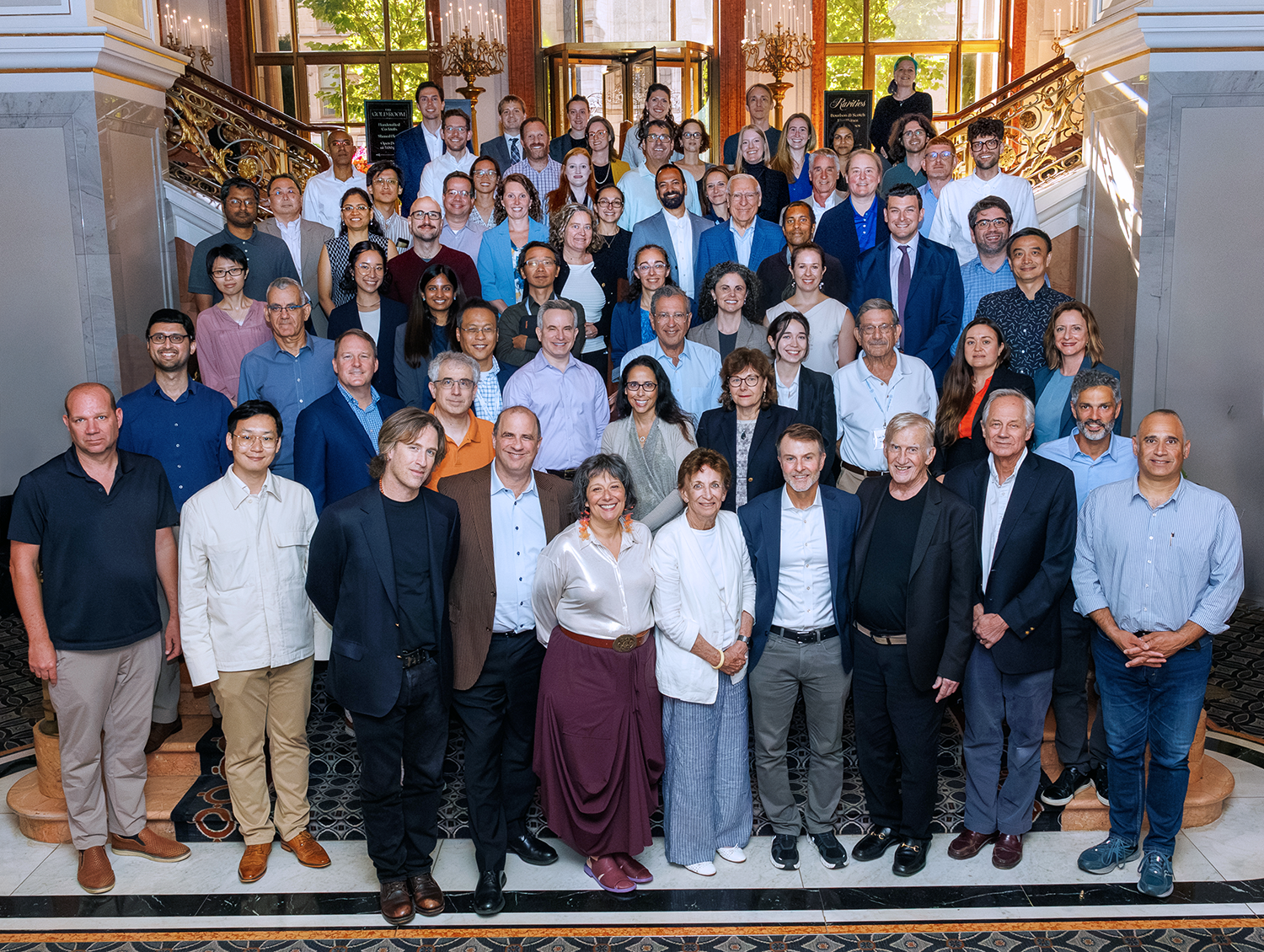
The 2025 Colton Consortium Symposium showcased the full spectrum of autoimmune discovery—from early-stage investigations to translational programs poised for clinical application—underscoring the Consortium’s commitment to scientific excellence across the research pipeline.
The week opened with a series of flash talks focused on early-stage pilot projects, offering a glimpse into the future of autoimmune research. Topics ranged from T cell regulation and immune-related adverse events to vascular inflammation, epigenetic control of immune responses, and emerging therapeutic strategies, including bispecific antibodies, exosome-based biomarkers, and inflammasome modulation. These concise presentations offered snapshots of bold hypotheses, innovative approaches, and the next generation of leaders in autoimmune research.
As the symposium progressed, mini keynotes highlighted more mature projects that have evolved from early pilot studies into translational science. As an example, David A. Hafler, MD, FANA, the William S. and Lois Stiles Edgerly Professor of Neurology and Professor of Immunobiology at the Yale School of Medicine, presented emerging evidence that Parkinson’s disease may start out as an autoimmune disease, demonstrating how an improved understanding of foundational autoimmune science can lead to the development of novel clinical therapies. These talks reinforced how sustained support and collaboration can transform early discoveries into strategies with real potential to improve patient care.
The debut of two newly established Centers of Excellence further illustrated the Consortium’s leadership in precision immunology. The Colton Center for RNA Exploration in Autoimmune Therapeutics (CREATE) is harnessing mRNA and lipid nanoparticle (LNP) technologies to engineer non-inflammatory treatments that precisely eliminate pathogenic immune cells. CREATE is led by Amit Bar-Or, MD, FRCP, FAAN, FANA, the Melissa and Paul Anderson President's Distinguished Professor; Peter Merkel, MD, MPH, Professor of Medicine (Rheumatology) and Epidemiology; Ali Naji, MD, PhD, the Jonathan E. Rhoads Professor of Surgical Science II; and Drew Weissman, MD, PhD, the Roberts Family Professor in Vaccine Research at the University of Pennsylvania and 2023 Nobel Laureate for his development of mRNA vaccines.
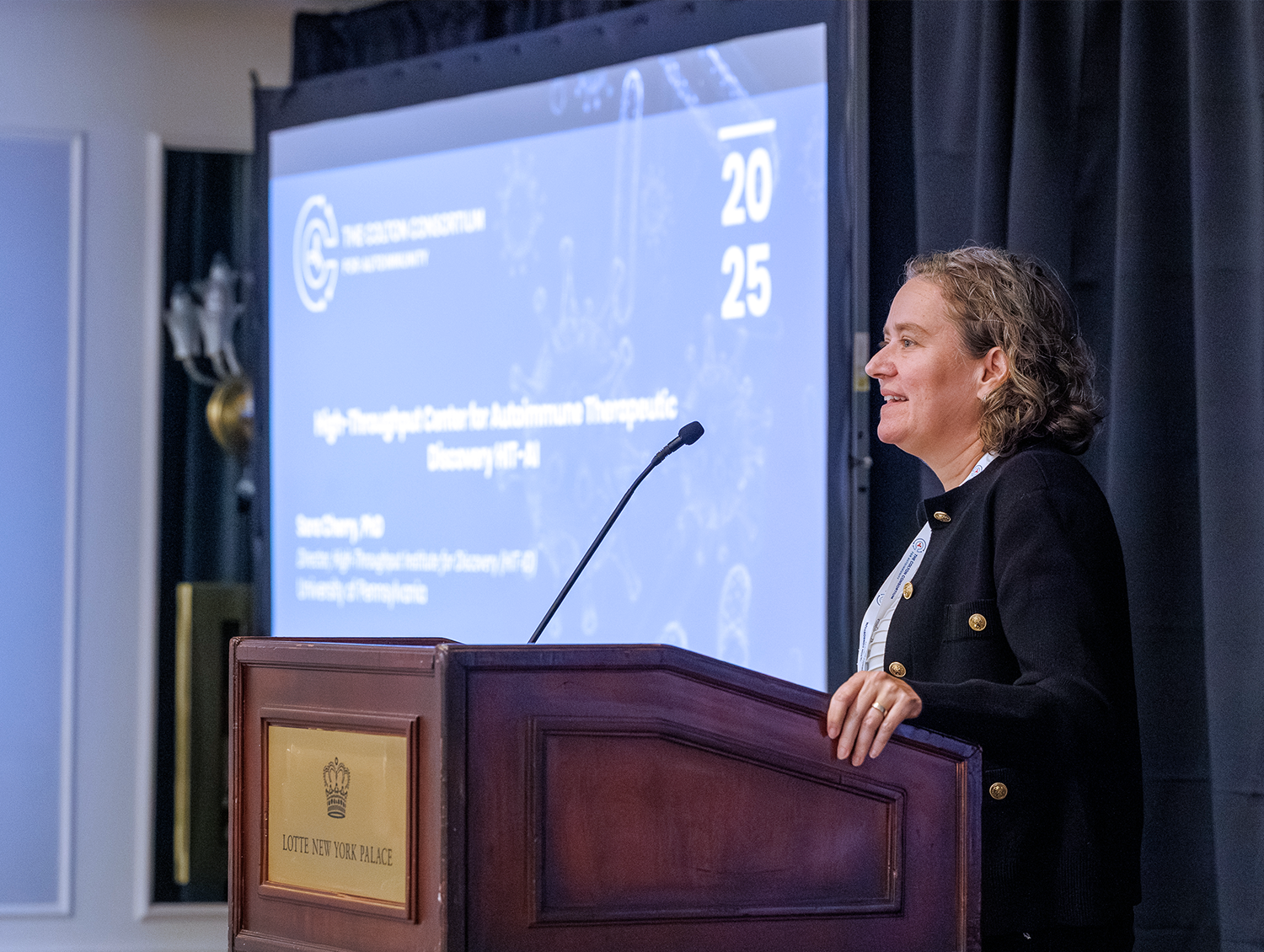
The High-Throughput Center for Autoimmune Therapeutic Discovery (HIT-AI) is building an integrated computational, experimental, and clinical pipeline to rapidly identify and repurpose FDA-approved drugs for more than 160 autoimmune diseases.
“Through HIT-AI, we’re combining high-throughput experimentation with computational innovation to uncover new treatment possibilities hidden in existing drugs. This kind of fundamental research—powered by collaboration across disciplines—is essential to accelerating breakthroughs for patients,” said Sara Cherry, PhD, the John W. Eckman Professor of Medical Science at the University of Pennsylvania. Dr. Cherry co-leads HIT-AI with David C. Fajgenbaum, MD, MBA, MSc and Jonathan J. Miner, MD, PhD.
These efforts complement work underway at CECTA, the Consortium’s flagship Center of Excellence for Cell Therapy in Autoimmunity. In a featured presentation, David L. Porter, MD, the Jodi Fisher Horowitz Professor in Leukemia Care Excellence at the University of Pennsylvania, described how CECTA is advancing engineered T cell therapies—building on Penn’s leadership in cell and gene therapy to tackle autoimmune diseases once considered untreatable. Dr. Porter co-leads CECTA with James L. Riley, PhD, Professor of Microbiology at the University of Pennsylvania.
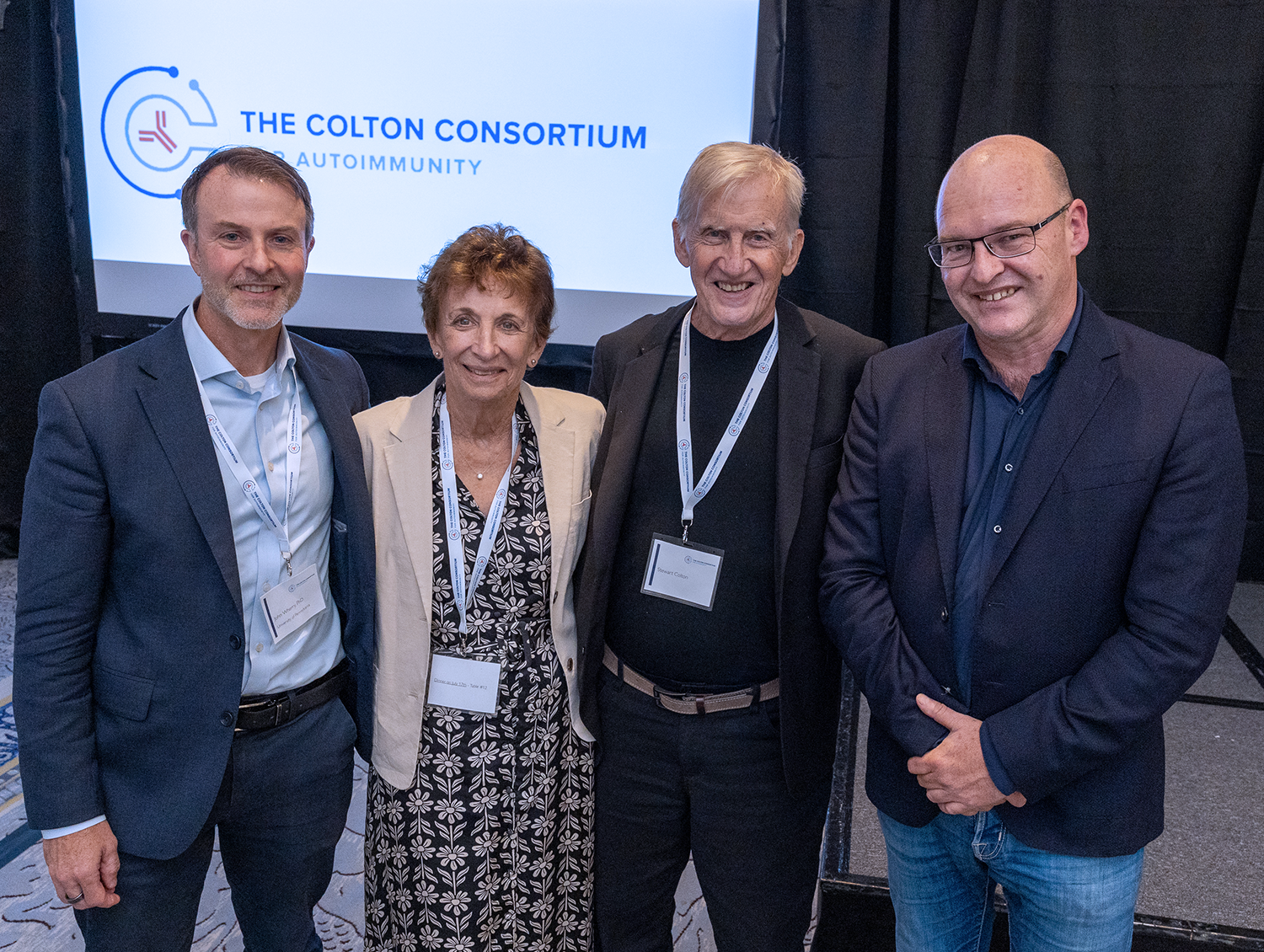
The science presented by CECTA was elevated by a keynote from Georg Schett, MD, Vice President of Research and Professor of Internal Medicine at the Friedrich-Alexander-Universität Erlangen-Nürnberg (Germany) and a global pioneer in applying CAR T cell therapy to autoimmune disease. Originally developed for B cell–driven cancers, CAR T therapy reprograms a patient’s immune cells to eliminate autoreactive B cells. Dr. Schett’s landmark studies in lupus demonstrated that a single infusion could induce durable, drug-free remission—restoring immune balance without compromising vaccine responses. His work highlighted the curative potential of cellular therapy in autoimmunity and sparked wide discussion about how bold, immune-based strategies could reshape treatment paradigms across diseases.
Together, these efforts reflect the growing momentum behind translational science within the Consortium—where high-risk, high-reward ideas are rapidly advancing from concept to clinic.
Attendees took note of the depth and breadth of science on display. “What stood out was the consistency of excellence—from pilot projects to advanced programs nearing the clinic. It’s rare to see a community that invests equally in early discovery and translational science—and does both so well,” said David B. Beck, MD, PhD, Assistant Professor at the NYU Grossman School of Medicine, who presented research on the relationship between somatic mutations and autoimmune disease.
From mechanistic insights to therapeutic breakthroughs, the Colton Consortium is setting a new standard for autoimmune research: rigorous, collaborative, and purpose driven.
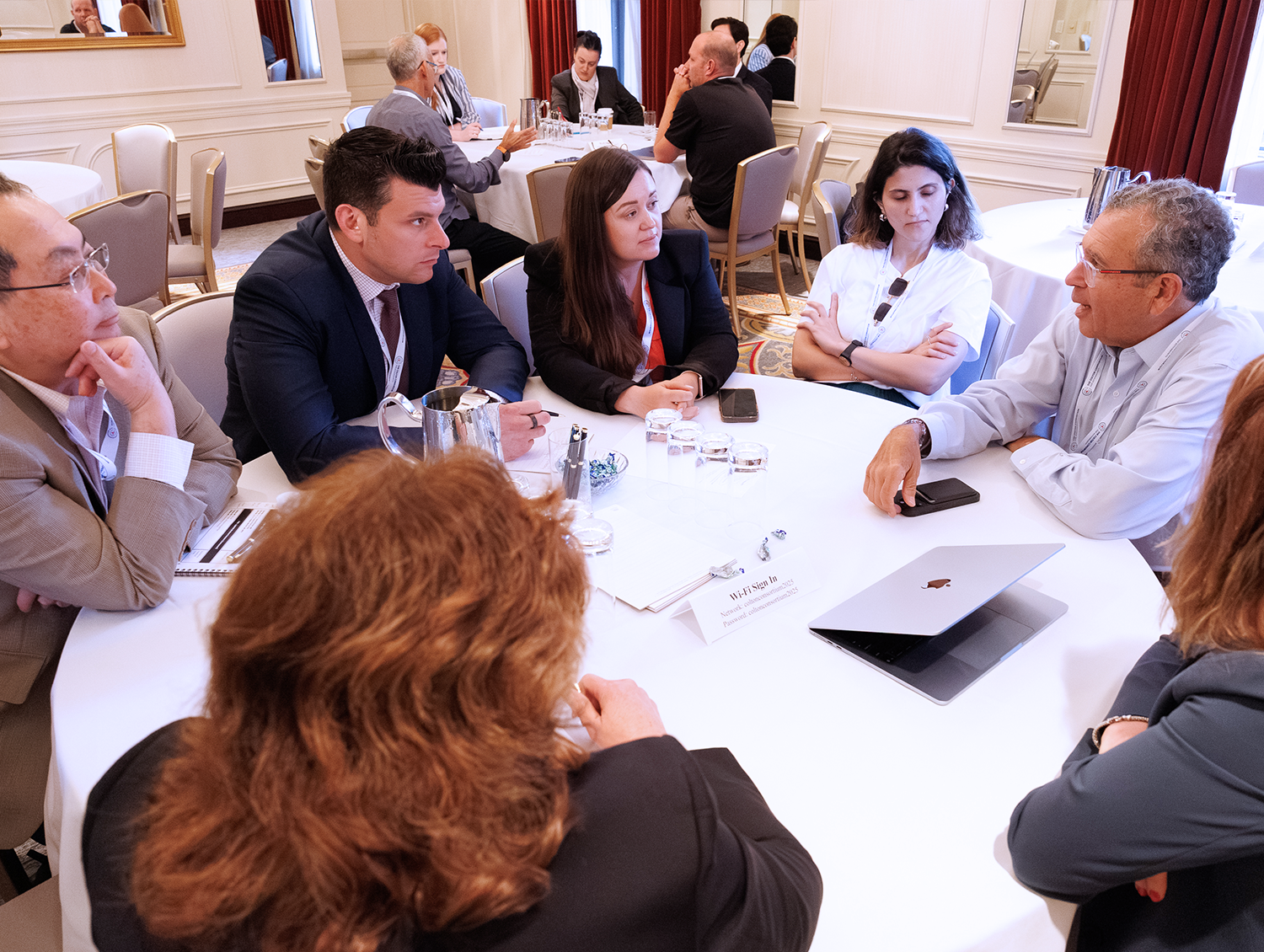
During the symposium, collaboration and community building emerged not just as guiding principles for the Consortium, but as the thread that wove together the week’s most impactful moments. The opening night of the symposium set the tone for the week with a lively “Meet & Greet” session for attendees in the style of “speed dating” to foster connections across research areas and institutions.
In a joint session held on the third day, investigators from all four Colton Centers offered powerful examples of how deeply integrated research partnerships are accelerating discoveries in autoimmunity. Uri Nevo, PhD, Professor of Engineering and Director of the Colton Center for Autoimmunity at Tel Aviv University and Edward M. Behrens, MD, the Joseph Hollander Professor in Pediatric Rheumatology at the Children’s Hospital of Philadelphia and the University of Pennsylvania shared how they are using agent-based modeling to better understand disease heterogeneity in lupus nephritis. Jose U. Scher, MD, the Steere Abramson Professor of Medicine and Director of the Judith and Stewart Colton Center for Autoimmunity at New York University and Alexis R. Ogdie, MD, MSCE, Professor of Medicine (Rheumatology) at the University of Pennsylvania reflected on a decade of collaborative work studying psoriatic disease across the Colton Centers. Carrie L. Lucas, PhD, Associate Professor of Immunobiology and Associate Director of the Colton Center for Autoimmunity at Yale University, rounded out the joint session with a presentation that offered insights into how rare, monogenic diseases can illuminate broader mechanisms of immune dysregulation.
“Working within the Colton Consortium has opened up entirely new dimensions of collaboration. By connecting researchers who study rare monogenic conditions with those focused on more common autoimmune diseases, we’re uncovering shared immune pathways and therapeutic targets we wouldn’t have seen in isolation. That kind of cross-institutional perspective is what makes this network so powerful,” said Dr. Lucas.
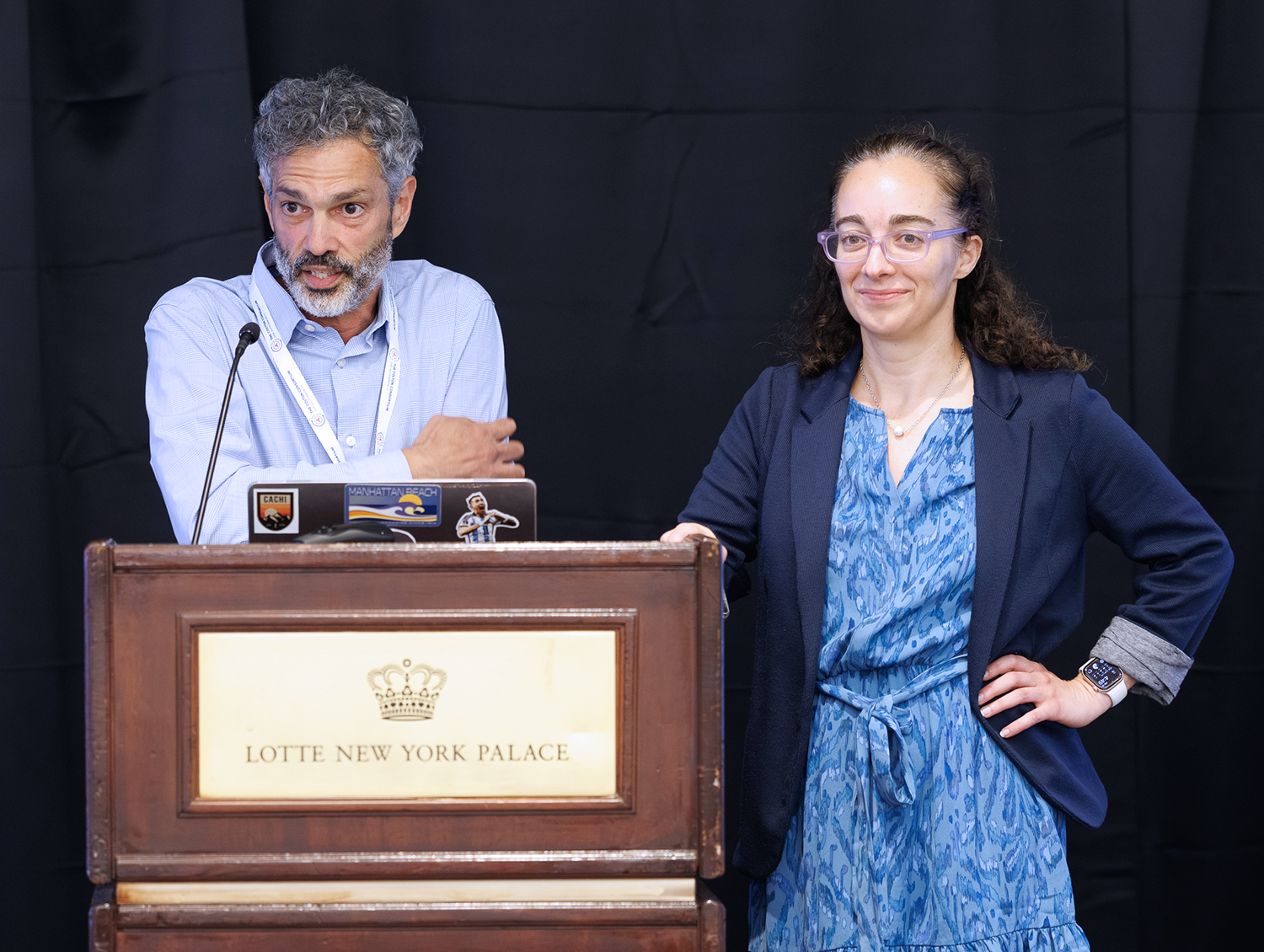
In addition to spotlighting collaborative projects across centers, many of the symposium’s presentations, breakout groups, and Q&A sessions focused on strengthening the Consortium’s shared infrastructure—ranging from biobanking platforms and informatics resources to trial readiness frameworks—all designed to promote real-time knowledge exchange and reproducibility. New initiatives like the Colton PhD & Postdoc Exchange Program and the Colton Consortium Virtual Speaker Series are further connecting researchers across institutions, helping to build a dynamic, cohesive scientific ecosystem that accelerates discovery and amplifies collective impact.
Translating scientific discoveries into better diagnostics and therapies for autoimmune diseases emerged as a central theme of the symposium. In his keynote address, David M. Lee, MD, PhD—the Global Immunology Therapeutic Area Head for Johnson & Johnson Innovative Medicine—emphasized the importance of integrated approaches that bridge early-stage discovery with patient-centered development strategies, illustrating how fundamental research findings must seamlessly transition from laboratory benches to clinical bedside application.
Throughout the week, breakout sessions and presentations highlighted a range of industry partnerships with leaders such as AstraZeneca, Johnson & Johnson, and Nomic Bio—underscoring the Consortium’s commitment to building structured pathways that link basic science to clinical innovation. A standout example was the announcement of the Colton Clalit Challenge, a data-sharing initiative between the Colton Center for Autoimmunity at Tel Aviv University and Clalit Health Services, Israel’s largest healthcare provider, and the Clalit Research Institute. By granting Consortium investigators access to one of the world’s most comprehensive longitudinal health datasets—including genomic, clinical, and behavioral data—the Challenge aims to accelerate advances in predictive modeling, biomarker discovery, and population-level insights.
“Our partnership with Clalit exemplifies how the Colton Consortium can unite academic excellence with the scale and reach of the private sector to drive real-world impact. By combining the Consortium’s scientific expertise with Clalit’s unparalleled clinical data and patient network, we can accelerate the translation of groundbreaking research into tangible improvements in diagnosis, treatment, and outcomes for people living with autoimmune diseases,” said Gali Lerman, PhD, Chief Scientific Officer for the Colton Center for Autoimmunity at Tel Aviv University.
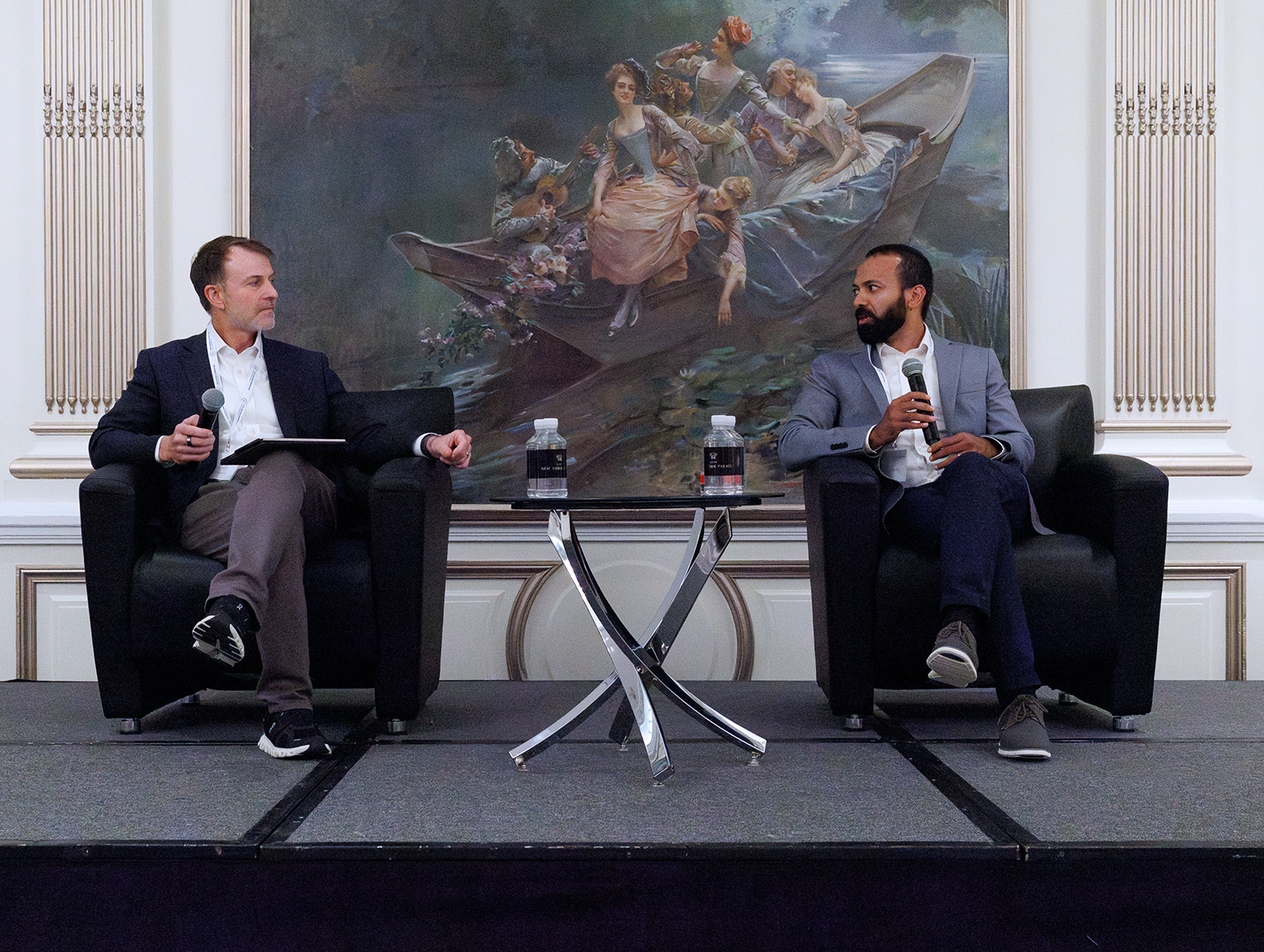
The symposium closed with an engaging fireside chat between Dr. Wherry and Adeeb Rahman, PhD, Chief Technology Officer at Immunai—a biotech company harnessing single-cell biology and artificial intelligence (AI) to map the immune system and accelerate therapeutic discovery. Dr. Rahman offered an insider’s perspective on how emerging biotech firms are changing the innovation landscape—reshaping traditional R&D pipelines and expanding what’s possible in immune-mediated disease treatment. He also spoke to the critical role of industry partnerships in bridging the gap between the bench and the bedside, particularly in advancing autoimmune research.
As the symposium drew to a close, one message stood out: Advancing autoimmune research will require scientific rigor, meaningful collaboration, and a shared commitment to improving patients’ lives. The conversations throughout the event reinforced that true breakthroughs rarely happen in isolation—they arise from the convergence of diverse expertise, where researchers, clinicians, industry partners, and patient advocates work together toward shared goals.
With its growing global network, strengthened infrastructure, and expanding partnerships, the Colton Consortium is well-positioned to support this model of collaborative science and help accelerate the path from discovery to real-world impact. As participants departed, the symposium offered more than fresh insights—it left behind a clearer sense of how cross-disciplinary collaboration can drive meaningful progress for people living with autoimmune diseases.
“Witnessing scientists from across the Consortium share breakthroughs—from revolutionary CAR T cell therapies to AI-driven precision medicine—was a powerful reminder of what global collaboration can achieve in the fight against autoimmune disease. This work fills our family with hope. We’re not just making incremental progress—we’re advancing toward a future where these diseases can be understood, prevented, and cured. That’s the future we’re fighting for,” said the Colton family.
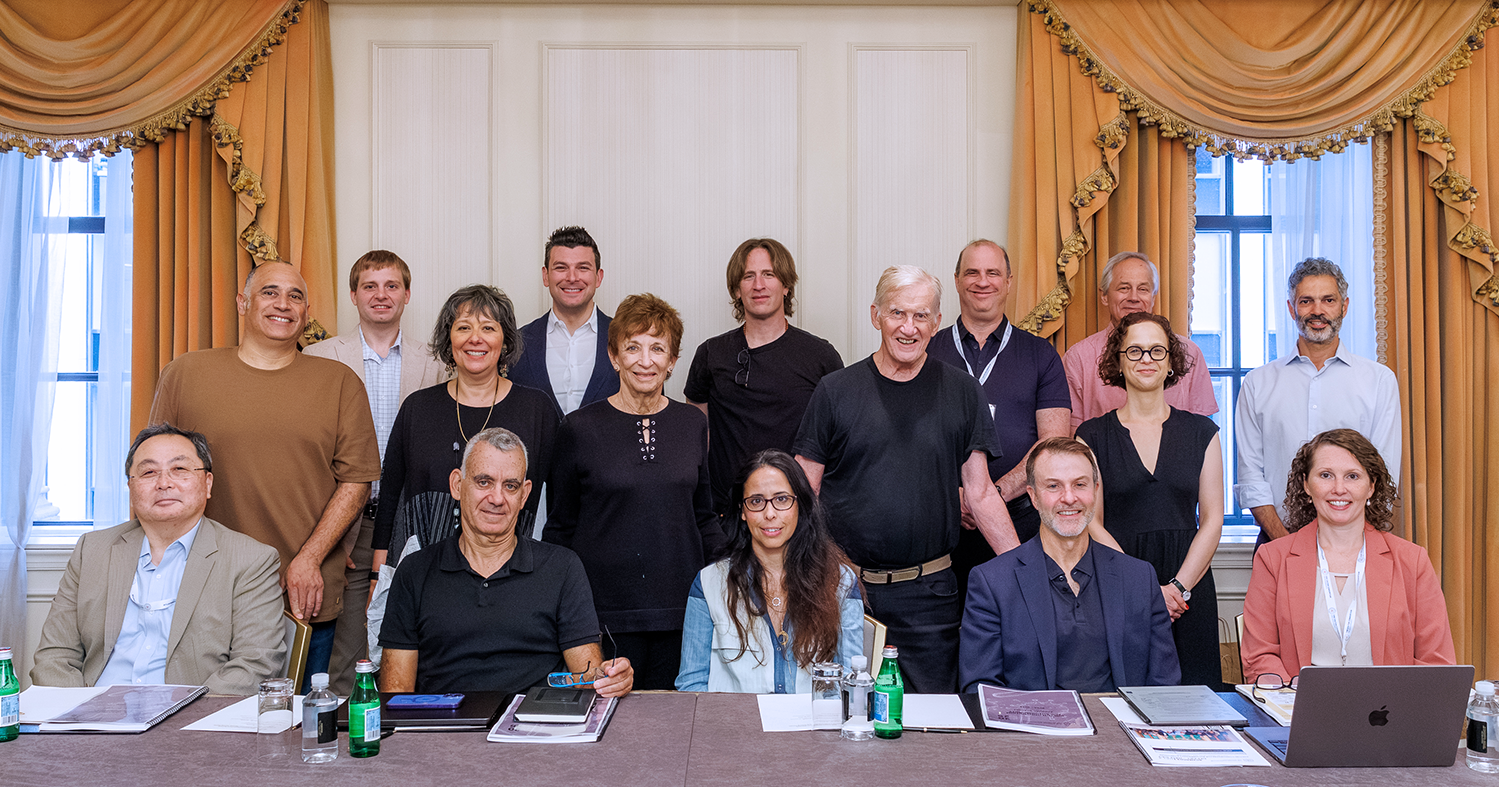
The Colton Consortium proudly sponsored the 2025 FASEB Autoimmunity Conference in Niagara Falls, a leading international forum advancing autoimmune research and fostering collaboration among scientists and clinicians.
The Colton Center for Autoimmunity at Yale University announced its 2025 award recipients, funding nine translational research projects with nearly $1M to advance diagnostics, treatments, vaccines, and technologies for autoimmune disease.
Penn Medicine’s newly renovated Immune Health facility will house the Penn Colton Center for Autoimmunity—an anchor of the global Colton Consortium—driving bold, cross-disciplinary collaboration to accelerate transformative discoveries in autoimmune disease research.